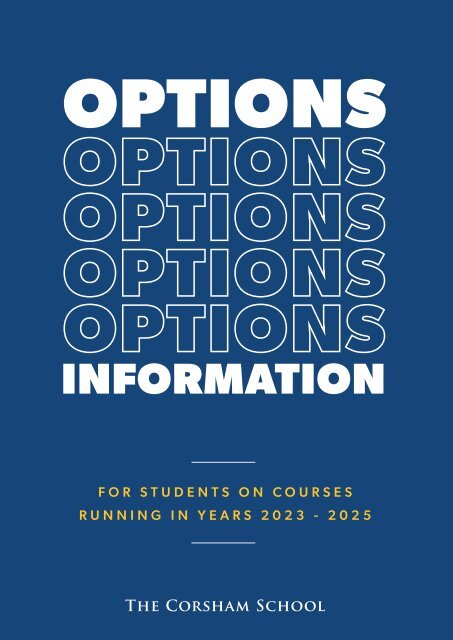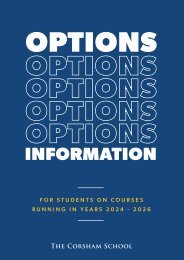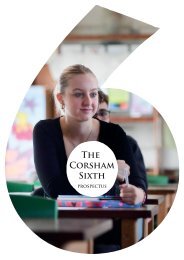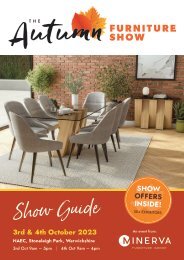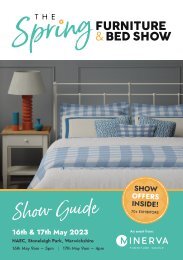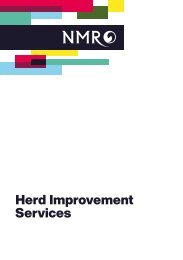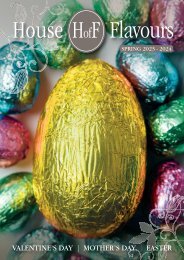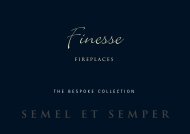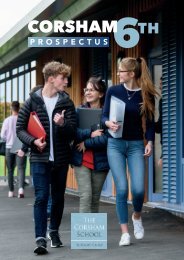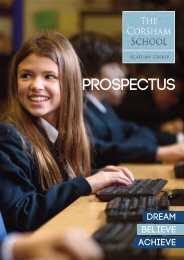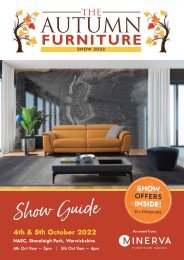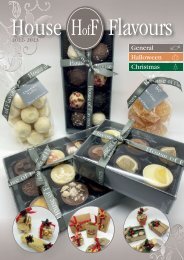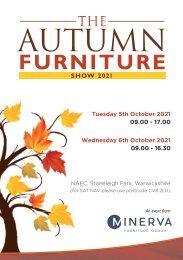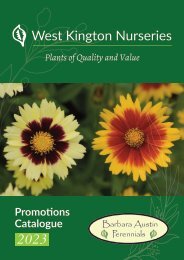The Corsham School Options Booklet
Create successful ePaper yourself
Turn your PDF publications into a flip-book with our unique Google optimized e-Paper software.
OPTIONS<br />
INFORMATION<br />
FOR STUDENTS ON COURSES<br />
RUNNING IN YEARS 2023 - 2025<br />
<strong>The</strong> <strong>Corsham</strong> <strong>School</strong>
CONTENTS<br />
INTRODUCTION .......................................................................................... 3<br />
GCSE CURRICULUM STRUCTURE ....................................................................4<br />
PATHWAYS ..................................................................................................5<br />
HOW TO CHOOSE OPTIONS.........................................................................6<br />
CORE CURRICULUM ................................................................................7<br />
ENGLISH LANGUAGE....................................................................................8<br />
ENGLISH LITERATURE ....................................................................................9<br />
MATHEMATICS ...........................................................................................10<br />
COMBINED SCIENCE TRILOGY ......................................................................11<br />
PHYSICAL EDUCATION ................................................................................12<br />
PSHE.........................................................................................................13<br />
OPTIONAL CURRICULUM .......................................................................14<br />
ART ...........................................................................................................15<br />
PHOTOGRAPHY..........................................................................................16<br />
TEXTILES ....................................................................................................17<br />
L1/2 BUSINESS STUDIES .............................................................................18<br />
GCSE COMPUTER SCIENCE..........................................................................19<br />
BTEC DIGITAL INFORMATION TECHNOLOGY .................................................20<br />
GCSE FOOD PREPARATION & NUTRITION.......................................................21<br />
GCSE DESIGN & TECHNOLOGY ...................................................................22<br />
DANCE .....................................................................................................23<br />
DRAMA ....................................................................................................24<br />
GEOGRAPHY ............................................................................................25<br />
HISTORY....................................................................................................26<br />
MEDIA STUDIES .........................................................................................27<br />
MODERN LANGUAGES ...............................................................................28<br />
GCSE MUSIC..............................................................................................29<br />
GCSE PHYSICAL EDUCATION ......................................................................30<br />
RELIGION AND PHILOSOPHY .......................................................................31<br />
OCR SPORTS SCIENCE ................................................................................32<br />
SCIENCE: TRIPLE AWARD ..........................................................................33<br />
GCSE SOCIOLOGY .....................................................................................34
INTRODUCTION<br />
You are reaching a really exciting and important part of your education at <strong>Corsham</strong> <strong>School</strong>. In<br />
January, you will be choosing the subjects you would like to study at GCSE. This is the first time in<br />
your education that you have a say in which subjects you would like to continue with. It is vital that<br />
you make these decisions well.<br />
NOVEMBER & DECEMBER<br />
Taster sessions of GCSE subjects in class<br />
Choice survey – this is where you indicate the subjects you might be interested in.<br />
This helps us to build the option blocks.<br />
JANUARY<br />
Y9 interim report – a chance to look at your strengths<br />
Parents evening – a chance to speak to your teachers about your current strengths<br />
GCSE <strong>Options</strong> evening – a chance to speak to subject teachers about options<br />
and potential choices to help you choose<br />
<strong>Options</strong> form submitted with your final choices<br />
www.corsham.wilts.sch.uk<br />
3
GCSE CURRICULUM<br />
Maths<br />
7<br />
CORE<br />
40%<br />
English<br />
Science<br />
8<br />
10<br />
60%<br />
OPTIONS<br />
PSHRE<br />
PE<br />
Option 1<br />
Option 2<br />
1<br />
4<br />
5<br />
5<br />
Option 3<br />
5<br />
CORE - 60%<br />
Option 4<br />
5<br />
Every student studies the ‘core curriculum’. <strong>The</strong>se subjects provide a foundation of skills, understanding and<br />
knowledge which are considered essential and are therefore compulsory for all students:<br />
● English: students will take both English<br />
Language and English Literature at GCSE<br />
● Mathematics<br />
● Physical Education: this is a recreational<br />
course which does not lead to a GCSE<br />
● Science: either Combined Science (equivalent of two GCSEs)<br />
or a triple science (certification of separate sciences - Biology,<br />
Chemistry and Physics) – you will need to use one of your<br />
option block choices to opt for triple Science.<br />
● PSHE – this is for personal development and does not lead<br />
to a GCSE<br />
OPTIONS CURRICULUM - 40%<br />
Most students should choose at least one of the following because the Department for education recommends<br />
that at least 75% of students follow an “Ebacc” curriculum. This means that they should be doing GCSEs in English<br />
Language and Literature, Maths, at least double Science, a Language and one of either History or Geography.<br />
● GCSE French ● GCSE Geography ● GCSE German ● GCSE History ● GCSE Spanish<br />
Students should then choose four of the following, ranking them from 1-4.<br />
GCSE ART (FINE ART)*<br />
GCSE COMPUTER SCIENCE or<br />
BTEC DIGITAL INFORMATION<br />
TECHNOLOGY*<br />
GCSE ART TEXTILES*<br />
L1/L2 BUSINESS STUDIES<br />
GCSE MEDIA STUDIES<br />
GCSE DANCE<br />
GCSE DRAMA<br />
GCSE PE or CAM NAT SPORTS<br />
SCIENCE*<br />
GCSE DESIGN & TECHNOLOGY<br />
GCSE PHOTOGRAPHY<br />
GCSE FOOD & NUTRITION<br />
GCSE FRENCH<br />
GCSE GERMAN<br />
GCSE HISTORY<br />
GCSE MUSIC<br />
GCSE SPANISH<br />
GCSE GEOGRAPHY<br />
GCSE RELIGION & PHILOSOPHY<br />
GCSE SOCIOLOGY<br />
GCSE TRIPLE SCIENCES<br />
4 www.corsham.wilts.sch.uk
PATHWAYS<br />
We suggest to help guide you into choices that will challenge you, engage you and build on your past learning to<br />
ensure you are following a curriculum that will give you success, suit your needs and will not create potential barriers<br />
for your future.<br />
Pathway Title Profile of Student Choices<br />
Pathway 3<br />
May have a history of high academic scores from tests<br />
going back to primary school, achieves well with<br />
academic challenges, may be aspiring to go to a top<br />
university, will probably be thinking about facilitating<br />
(academic) A levels post 16<br />
Have to choose one foreign language in<br />
one block, then one of either History or<br />
Geography in another then 2 further free<br />
choices but should consider triple<br />
sciences<br />
Example<br />
Spanish, Geography, Art, Drama<br />
Pathway 2<br />
Aiming for 5 and above in English, Maths, Sciences and<br />
in a range of other GCSEs. May have high target grades<br />
(5+). Will probably be thinking about A levels and or<br />
Level 3 Tech qualifications/Apprenticeships post 16<br />
Must do at least once of either History,<br />
Geography, Computing, Foreign<br />
Languages, 3 further free choices<br />
Example<br />
Photography, DS, Business, History<br />
Pathway 1<br />
May do best when more practical and “hands-on”<br />
subjects are mixed with academic. May be more<br />
successful in project work and unit tests rather than<br />
everything based on a final exam at the end of 2 years,<br />
may be considering Level 3 Tech qualifications,<br />
Apprenticeships or vocational courses post 16<br />
Should seriously consider one of History,<br />
Geography, Computing, Foreign<br />
Languages alongside GCSE equivalents<br />
such as Btec DiT, Graphics, Business and<br />
Sport Science but 4 free choices<br />
Example<br />
Graphics, Geography, French, Sport Science<br />
Please note that this is a government expectation.<br />
Whilst the “Ebacc” is not a qualification in itself, it is a nationally recognised performance measure, covering subjects<br />
that provide transferrable skills and enable students to access a broad variety of options post 16. Many employers,<br />
Further Education and Higher Education establishments look for this range of subjects in candidates. Pupils taking<br />
EBacc subjects at GCSE are more likely to take A-levels, and to study “facilitating” subjects – those the Russell Group<br />
universities say are more helpful for getting onto a degree course. This is why we strongly recommend it for our<br />
Pathway 3 students.<br />
If you have real concerns that this is not suitable for your child, please do contact us.<br />
Please note that some combinations are not permitted as the content of the courses is too similar and counts as the<br />
same qualification.<br />
* You are only allowed to choose one of Art & textiles and one of either GCSE Computer Science or BTEC DiT. Equally, only one of PE GCSE or<br />
Camnat Sport Science is permitted.<br />
www.corsham.wilts.sch.uk<br />
5
OPTIONS<br />
How to choose?<br />
✔ DO choose subjects which you like<br />
✔ DO choose subjects which you are successful in<br />
✔ DO choose subjects which you may need for a career or further education<br />
✔ DO find out everything that you can about the subject before you choose it. Once you have started a subject we<br />
expect you to stick with it!<br />
✔ DO talk to the people who know you<br />
✔ DO listen to the advice your subject teachers give you<br />
✗ DON`T choose a subject just because your friend has chosen it<br />
✗ DON`T choose a subject just because you like (or dislike) a particular teacher: they may not end up teaching you!<br />
What help is there?<br />
● Year 9 assembly about the options process<br />
● Year 9 <strong>Options</strong> evening<br />
● Year 9 parents evening<br />
● Students will spend time during PSHE learning about subject choices and the options process<br />
● Students can request further careers advice from our in-house school’s careers adviser<br />
● Students will hear about the options subjects available to them in Year 9 lessons and teachers will be available to<br />
answer questions they have about the courses<br />
● Parents can contact subject leaders if they have any questions – see please here for contact email addresses<br />
After the online options choice forms have been completed, some Year 9 students may be contacted by staff to discuss<br />
the suitability of their choices. Learning Support teachers will guide students to help them make suitable option<br />
choices.<br />
How do we process options forms?<br />
We offer a wide range of option choices for our students, to provide individuals with the most personalised curriculum<br />
we can. Practical constraints on the timetable, of group size and of resources, sometimes mean that students are not<br />
allocated their first option choice in a block and this can also mean that sometimes a subject may not run. This means<br />
that we cannot guarantee that everyone will get their first option choice.<br />
It may, in certain circumstances, be possible for students to change choices before September if class sizes and<br />
combinations allow. Students who want to change their option choices after the deadline will have to wait until all the<br />
forms have been processed. If the change is possible at that stage, it will be made, but if groups are full, the original<br />
choice will have to stand. For this reason, it is very important that students choose their options carefully and<br />
thoughtfully. Once courses begin there will be limited opportunities to change; students are not normally able to<br />
change courses after four weeks of the course.<br />
6 www.corsham.wilts.sch.uk
CORE<br />
CURRICULUM<br />
2023 - 2025<br />
<strong>The</strong> <strong>Corsham</strong> <strong>School</strong>
ENGLISH<br />
LANGUAGE<br />
BOARD: AQA 8700<br />
<strong>The</strong> study of English helps you to communicate<br />
clearly, effectively and appropriately through both<br />
the written and spoken word. <strong>The</strong> more you are<br />
able to speak and write with confidence the more<br />
successful you will be, not just academically, or in<br />
your future career, but in your personal life as well.<br />
English is therefore studied by all students.<br />
COURSE CONTENT AND ASSESSMENT<br />
All students will study English Language and English<br />
Literature. <strong>The</strong> course is assessed by two examinations at the<br />
end of Year 11.<br />
Each paper has a distinct identity to better support high<br />
quality provision and engaging teaching and learning. Paper<br />
1, ‘Explorations in Creative Reading and Writing’, looks at<br />
how writers use narrative and descriptive techniques to<br />
engage the interest of readers. Paper 2, ‘Writers' Viewpoints<br />
and Perspectives’, looks at how different writers present a<br />
similar topic over time.<br />
Spoken language (previously speaking and listening) will<br />
emphasise the importance of the wider benefits that<br />
speaking and listening skills have for students. <strong>The</strong> unit will<br />
get a separate mark from GCSE.<br />
Paper 1: Explorations in Creative Reading and Writing<br />
Paper 2: Writers' Viewpoints and Perspectives<br />
What's assessed<br />
Section A: Reading<br />
• Four questions on one literature fiction extract<br />
Section B: Writing<br />
• descriptive or narrative writing<br />
How it's assessed<br />
Section A: Reading<br />
• one non-fiction text and one literary non-fiction text<br />
Section B: Writing<br />
• writing to present a viewpoint<br />
How it's assessed<br />
• written exam: 1 hour 45 minutes<br />
• 80 marks<br />
• 50% of GCSE<br />
Questions<br />
Reading (40 marks) (25%) – one single text<br />
• 1 short form question (1 x 4 marks)<br />
• 2 longer form questions (2 x 8 marks)<br />
• 1 extended question (1 x 20 marks)<br />
Writing (40 marks) (25%)<br />
• 1 extended writing question (24 marks for content,<br />
16 marks for technical accuracy)<br />
Assessed<br />
• written exam: 1 hour 45 minutes<br />
• 80 marks<br />
• 50% of GCSE<br />
Questions<br />
Reading (40 marks) (25%) – two linked texts<br />
• 1 short form question (1 x 4 marks)<br />
• 2 longer form questions (1 x 8, 1 x 12 marks)<br />
• 1 extended question (1 x 16 marks)<br />
Writing (40 marks) (25%)<br />
• 1 extended writing question (24 marks for content,<br />
16 marks for technical accuracy)<br />
TIERS OF ENTRY<br />
<strong>The</strong>re is only one tier of entry. All students will do the same exam papers.<br />
What the course could lead on to: <strong>The</strong> course is a good foundation for further study in the sixth form – in any subject. A high<br />
grade is necessary if you wish to study English at ‘A’ level or to continue your education at university. A good performance is also<br />
valued by employers.<br />
8 www.corsham.wilts.sch.uk
ENGLISH LITERATURE<br />
BOARD: AQA 8700<br />
All students will study the AQA English Literature<br />
GCSE. <strong>The</strong> study of literature not only extends<br />
your experience of reading and writing, it also<br />
develops your critical and analytical skills which<br />
will be of benefit to you generally, not just in your<br />
performance on this course.<br />
COURSE CONTENT AND ASSESSMENT<br />
Study of all of the texts involves note-making, essays and a<br />
range of analytical activities. <strong>The</strong>re is plenty of group and<br />
whole class discussion and whenever possible theatre trips<br />
are arranged so that you gain as wide an experience of<br />
literature as possible. We also look at films to see how a<br />
particular piece transfers from page to screen.<br />
Paper 1: Shakespeare and the 19th-century<br />
Paper 2: Modern texts and poetry<br />
What's assessed<br />
How it's assessed<br />
What's assessed<br />
How it's assessed<br />
• Shakespeare<br />
• 1 hour 45 minute written exam<br />
• Modern texts<br />
• 1 hour 45 minute written exam<br />
• <strong>The</strong> 19th-century<br />
novel<br />
• 64 marks<br />
• 40% of GCSE<br />
• Poetry<br />
• Unseen poetry<br />
• 64 marks<br />
• 40% of GCSE<br />
Questions<br />
Questions<br />
Section A Shakespeare: students will answer one question<br />
on their play of choice. <strong>The</strong>y will be required to write in detail<br />
about an extract from the play and then to write about the<br />
play as a whole.<br />
Section A Modern texts: students will answer one essay<br />
question from a choice of two on the modern prose or drama<br />
text studied.<br />
Section B <strong>The</strong> 19th-century novel: students will answer one<br />
question on their novel of choice. <strong>The</strong>y will be required to<br />
write in detail about an extract from the novel and then to<br />
write about the novel as a whole.<br />
Section B Poetry: students will answer one comparative<br />
question on one named poem printed on the paper and one<br />
other poem from their chosen anthology cluster.<br />
Additional information<br />
Section C Unseen poetry: students will answer one question<br />
on each of two unseen poems and one comparative<br />
question.<br />
TIERS OF ENTRY<br />
<strong>The</strong>re is only one tier of entry.<br />
What the course could lead on to: Because the study of<br />
literature broadens your experience and develops your<br />
analytical skills, it is valued by a wide range of employers and<br />
educational institutions. A grade 5 is necessary if you are to<br />
study English at ‘A’ level.<br />
www.corsham.wilts.sch.uk<br />
9
MATHEMATICS<br />
BOARD: EDEXCEL LINEAR (9-1)<br />
Mathematics is a core subject and therefore compulsory. GCSE Mathematics changed in 2017 to a more<br />
demanding course designed to test student’s ability to use and interpret mathematics as well as simply solving the<br />
problems. <strong>The</strong> volume of the subject content has also increased with the total time for the examinations is<br />
increasing from 3½ to 4½ hours. <strong>The</strong> new grading structure grades students from grade 9 to 1. In the assessments<br />
there’s a greater emphasis on problem solving and mathematical reasoning, with more marks being allocated to<br />
these higher-order skills. <strong>The</strong> course will build on the work you have done in Years 7 - 9.<br />
COURSE CONTENT AND ASSESSMENT<br />
<strong>The</strong>re remains the 2 different levels of entry for Mathematics<br />
Target grades<br />
Foundation level 1 to 5<br />
Higher level 4 to 9<br />
<strong>The</strong> actual work you do will depend on which level you are going to<br />
be entered for. All students will follow a course which develops<br />
further their knowledge, understanding and skills in Number<br />
• Properties and calculation<br />
• Fractions, decimals and percentages<br />
• Measures and accuracy<br />
Algebra<br />
• Notation, vocabulary and manipulation<br />
• Graphs<br />
• Solving equations and inequalities<br />
• Sequences<br />
Ratio, proportion and rates of change<br />
Geometry and measures<br />
• Properties and constructions<br />
• Mensuration and calculation<br />
• Vectors<br />
PROBABILITY STATISTICS<br />
During Year 10, you will have regular assessments based on the work you have covered in<br />
class. <strong>The</strong>se assessments will be used to make sure you are entered at the correct level as<br />
well as preparing you for tackling the GCSE Linear exam at the end of the course.<br />
At the end of Year 11 there will be three written exams.<br />
Two of the papers are calculator and one is noncalculator.<br />
All are 1 hour and 30 minutes long.<br />
<strong>The</strong>se assessments will be taken in the summer of 2023<br />
What the course could lead on to:<br />
Mathematics is an essential requirement for almost any<br />
job. It is important therefore that you get the best possible<br />
grade at GCSE. If you enjoy mathematics you might<br />
consider taking it at A Level.<br />
10 www.corsham.wilts.sch.uk
COMBINED<br />
SCIENCE<br />
TRILOGY<br />
BOARD: AQA 8464<br />
AIMS/APPROACHES ADOPTED<br />
• encourages students to develop a critical approach to scientific evidence.<br />
• explores the implications of science for society<br />
• is suitable as a basis for further study of science<br />
• aims to develop the scientific literacy needed by every citizen<br />
• <strong>The</strong> Combined Science course provides two GCSEs in Science.<br />
OUTLINE OF THE CONTENT OF THE TEACHING UNITS:<br />
<strong>The</strong> topics for each subject area will include<br />
Biology - Cell biology, Organisation, Infection and response,<br />
Bioenergetics, Homeostasis and response, ‘Inheritance,<br />
variation and evolution’ and also Ecology.<br />
Chemistry – Atomic structure and the periodic table, Bonding,<br />
structure, and the properties of matter, Quantitative chemistry,<br />
Chemical changes, Energy changes, the rate and extent of<br />
chemical change, Organic chemistry, Chemical analysis,<br />
Chemistry of the atmosphere, Using resources.<br />
OUTLINE OF THE SCHEME OF ASSESSMENT:<br />
• Six exam papers, each one hour and 15 minutes which can<br />
be all Higher or all Foundation Tier.<br />
• 15% of the marks are for questions based on experiments,<br />
apparatus and their techniques.<br />
PROGRESSION TO WHICH LEVEL 3 COURSES<br />
Progression to which Level 3 courses<br />
Physics – Forces, Energy, Waves, Electricity, Magnetism and<br />
electromagnetism, Particle model of matter, Atomic structure m<br />
<strong>The</strong> teaching and learning of ‘Working Scientifically’ and<br />
practical assessment is integrated into teaching and learning of<br />
science content.<br />
www.corsham.wilts.sch.uk<br />
11
PHYSICAL EDUCATION<br />
HEALTHY ACTIVE LIFESTYLES – NO GCSE<br />
Making informed decisions about healthy, active lives.<br />
<strong>The</strong> course aims to provide enjoyable opportunities for participation in various physical activities conducive to a<br />
healthy lifestyle while further developing leadership skills and making informed choices about future participation.<br />
COURSE CONTENT<br />
All students will follow a curriculum, which offers as much choice as possible.<br />
Overcoming Opponents – invasion games, striking and fielding, net/wall games<br />
Hockey, Netball, Rugby, Football, Badminton, Basketball, Volleyball, Tennis, Lacrosse, Handball, Cricket, Table Tennis, Water<br />
Polo, Rocketball, Softball and Rounders<br />
Students will play the full recognised version of a competitive game using more advanced strategies and tactics. Improvement of<br />
personal performance and co-operation with others will be equally important. An understanding of the rules will be acquired<br />
through performance, leading and officiating.<br />
Identifying and solving problems & Performance at maximum levels<br />
This will include competitive swimming, distance events, personal survival, resuscitation and recreational swimming as well as a<br />
varied outdoor adventurous activities including use of the climbing wall in small groups where possible.<br />
Exercising safely and effectively: Athletics. Aerobics and Circuit Training<br />
Students will plan, carry out and evaluate a personal training schedule. <strong>The</strong>y will learn how to improve their performance and<br />
apply appropriate strategies.<br />
In Year 11 they will have the opportunity to use the Fitness Suite at the Springfield Centre<br />
Accurate Replication<br />
Trampolining: Introduction of trampolining in a safe environment. Practice of the basic skills leading to sequence work. Working<br />
towards BTF Awards (Preliminary, bronze and silver) for those who wish to.<br />
TEACHING GROUPS AND CONTINUITY<br />
Students will learn and participate in mixed ability or pathway groups. <strong>The</strong> curriculum ensures that students of all levels of ability<br />
will be catered for and that the courses offered will provide a stimulus for future participation. Students are expected to continue<br />
from key Stage 3 progression and be able to lead and officiate warm-ups, skills-based activities and organise<br />
games/compositions/sequences from their own knowledge. <strong>The</strong> use of the Springfield Centre is a particular focus for students,<br />
especially in Year 11. All the work covered will be appropriate to developing a healthy, active lifestyle as an adult.<br />
12 www.corsham.wilts.sch.uk
PSHE<br />
PREPARATION FOR ADULT LIFE AND WORK – NO GCSE<br />
PSHE education is a premium subject through which pupils develop the knowledge, skills and attributes they need<br />
to keep themselves healthy, safe and prepared for adult life and work. PSHE education has an impact on both<br />
academic and non-academic outcomes for pupils, particularly the most vulnerable and disadvantaged.<br />
In PSHE, the goal is to develop the self-awareness, confidence and skills that all young people need to thrive in a<br />
highly competitive world. Students will learn to understand and consider the consequences of their decisions and<br />
gain the knowledge and skills to seek advice on personal issues which will help to equip them<br />
In PSHE, we help to develop the opportunities for all students to both develop and demonstrate that they can take<br />
responsibility for their own learning. Furthermore, we seek to help all students identify personal targets for their<br />
career choices. Students will develop their ability to evaluate alternative courses of action for health and<br />
wellbeing, and learn strategies for managing independent living including relationships with others. <strong>The</strong>y will<br />
learn to clarify their views and opinions through discussions with peers and interaction with the subject matter in<br />
lessons delivered by teachers, health professionals and visitors to the school.<br />
<strong>The</strong>re is no formal assessment for PSHE<br />
COURSE CONTENT<br />
PSHE is delivered through timetabled lessons once a fortnight by specialists and through the tutor programme, and will cover the<br />
following topics over Years 10 & 11:<br />
• learning to learn;<br />
• revision techniques and preparation for examinations;<br />
• relationships and sex education;<br />
• alcohol and drugs education;<br />
• financial education;<br />
• crime and the criminal justice system;<br />
• living in the wider world as an independent adult;<br />
• employability and enterprise;<br />
• health and wellbeing including practical healthy eating.<br />
www.corsham.wilts.sch.uk<br />
13
OPTIONAL<br />
CURRICULUM<br />
<strong>The</strong> <strong>Corsham</strong> <strong>School</strong>
ART<br />
BOARD: AQA 8202<br />
WHO WOULD BENEFIT FROM AND<br />
ENJOY THIS COURSE<br />
Students who enjoy drawing and painting, mixed media,<br />
sculpture and printmaking. Students will benefit from a strong<br />
foundation to progress onto art and design related courses or<br />
career pathways. <strong>The</strong> course provides students with a wide<br />
range of creative and exciting opportunities to explore their<br />
interests in fine art in ways that are personally relevant.<br />
COURSE CONTENT AND ASSESSMENT<br />
Students will be introduced to a variety of experiences exploring<br />
a range of fine art media, techniques and processes, including<br />
both traditional and new technologies.<br />
In Year 10 you will be asked to complete a sustained project<br />
alongside a selection of further work. A project should<br />
demonstrate an ability to sustain work from initial starting points<br />
or project briefs to the realisation of intentions and include<br />
evidence of research, the development of ideas and meaningful<br />
links with critical/contextual sources.<br />
AO1 Develop ideas through investigations, demonstrating<br />
critical understanding of sources.<br />
AO2 Refine work by exploring ideas, selecting and<br />
experimenting with appropriate media,<br />
materials, techniques and processes.<br />
AO3 Record ideas, observations and insights relevant to<br />
intentions as work progresses.<br />
AO4 Present a personal and meaningful response that realises<br />
intentions and demonstrates understanding of visual language.<br />
EXAM BOARD LINK FOR MORE<br />
DETAILED INFORMATION:<br />
http://www.aqa.org.uk/subjects/art-and-design/gcse/artand-design-8201-8206<br />
What the course could lead to: A further art and design related<br />
course, like an A Level Art course or an equivalent course at<br />
college. <strong>The</strong> course will also lead to career pathways in art and<br />
design.<br />
<strong>The</strong> first project in year 10 follows the theme of ‘<strong>The</strong> Surreal and<br />
Sublime’. Within this project you will be explore a variety of<br />
media and techniques like paint, pastels, collage, digital work<br />
and printing. Students will learn about artist like Francis Bacon,<br />
Ian Murphy and Andrea Matus to inform the subject content of<br />
their work. It is recognised that you will have individual interests<br />
and skills, which will be encouraged throughout the year.<br />
In Year 11, students will complete an externally set assignment,<br />
which is a practical project set by the exam board. <strong>The</strong> students<br />
receive the exam paper in the beginning of January and<br />
complete preparation work before their final timed (10 hours)<br />
piece of work.<br />
THE STRUCTURE OF FINE ART GCSE:<br />
Component 1 Portfolio 60%<br />
Component 2 Externally Set Assignment 40%<br />
Assessment for GCSE Art is at the end of Year 11 when<br />
coursework provides 60% marks and an externally set<br />
assignment provides 40% marks. Work will be marked by the<br />
centre and moderated by the exam board AQA. Students need<br />
to evidence the four assessment objectives in their sketchbooks:<br />
www.corsham.wilts.sch.uk<br />
15
PHOTOGRAPHY<br />
BOARD: AQA 8206<br />
WHO WOULD BENEFIT FROM AND<br />
ENJOY THIS COURSE<br />
Self-motivated and well-organised students who enjoy looking<br />
at their surroundings with an imaginative eye, learning new<br />
skills, and working both technically and creatively.<br />
COURSE REQUIREMENTS<br />
It is advisable that students have their own digital camera (not a<br />
smartphone). Teachers are happy to advise.<br />
COURSE CONTENT<br />
This course will teach students to look at the world in a creative<br />
way, in order to visually communicate their ideas through<br />
photography. Students will develop critical analyses of artists’<br />
work, helping to develop their own ideas through personal<br />
response, practical application and written reflections.<br />
<strong>The</strong> emphasis will be on project work that allows students to<br />
fully develop ideas over time. Students will produce a portfolio<br />
that consists of a number of short, teacher-led projects leading<br />
to a sustained, independent project. A typical theme might be<br />
‘Objects and Belongings’, which takes inspiration from famous<br />
photographers and encourages students to see their world<br />
from a different angle. <strong>The</strong>re is an externally set assignment at<br />
the end of the course.<br />
Throughout this course, students will learn about a variety of<br />
photographic media, techniques and processes including<br />
some hands-on experimentation with traditional techniques in<br />
our dedicated darkroom, lighting in our studio and of course<br />
the of use computers for Photoshop and digital media. We<br />
encourage students to use these techniques and equipment to<br />
make thought-provoking work that shows a high degree of skill<br />
and technical knowledge, and personally developed ideas.<br />
This coursework earns marks over the entire course resulting in<br />
a final grade. Students will use workbooks to demonstrate all<br />
practical learning, idea development and critical analysis.<br />
<strong>The</strong> Externally Set Assignment is a similar format to the<br />
sustained project, but the themes are set by the exam board<br />
AQA. Students will have approximately 12 weeks to research,<br />
take photos, and develop ideas further. <strong>The</strong>y then have 10<br />
hours of supervised time to produce a final portfolio.<br />
Students will develop valuable transferable skills in creative and<br />
practical problem solving, developing ideas through research,<br />
practical application, analysis and evaluation, and gain better<br />
organisation.<br />
16 www.corsham.wilts.sch.uk
TEXTILES<br />
BOARD: AQA 8204<br />
WHO WOULD BENEFIT FROM AND<br />
ENJOY THIS COURSE<br />
Students who have enjoyed textile lessons in KS3. Students who<br />
enjoy exploring a range of textile media, techniques and<br />
processes, including both traditional and new technologies.<br />
COURSE CONTENT AND ASSESSMENT<br />
<strong>The</strong> course requires you to complete a portfolio of fine art<br />
textiles work about surface decoration and fabric manipulation.<br />
In Year 10, the course focuses on art and textile techniques in the<br />
form of 2D, relief and 3D work based on a culture of the<br />
student’s choice. <strong>The</strong>re will be the opportunity to develop 2D<br />
art skills such as drawing, stencilling, printing and collage as well<br />
as being introduced to photography techniques within the<br />
darkroom and exploring methods of image transfer on to fabric.<br />
Students will learn a range of textile techniques such as<br />
weaving, embroidery, appliqué, machine stitching and fabric<br />
manipulation. Students will explore a range of materials and<br />
techniques in a sketchbook and will also have the opportunity to<br />
study the work of artists, designers and craftspeople, which will<br />
lead to the production of larger mixed media pieces.<br />
AO2 Refine work by exploring ideas, selecting and<br />
experimenting with appropriate media, materials, techniques<br />
and processes.<br />
AO3 Record ideas, observations and insights relevant to<br />
intentions as work progresses.<br />
AO4 Present a personal and meaningful response that realises<br />
intentions and demonstrates understanding of visual language.<br />
EXAM BOARD LINK FOR MORE<br />
DETAILED INFORMATION:<br />
http://www.aqa.org.uk/subjects/art-and-design/gcse/artand-design-8201-8206<br />
What the course could lead to: A further art and design related<br />
course, like an A Level Textiles course or an equivalent course at<br />
college. <strong>The</strong> course will also lead to career pathways in art and<br />
design.<br />
In Year 11, students will complete an externally set assignment,<br />
which is a practical project set by the exam board. <strong>The</strong> students<br />
receive the exam paper in the beginning of January and<br />
complete preparation work before their final timed (10 hours)<br />
piece of work.<br />
THE STRUCTURE OF ART TEXTILES GCSE:<br />
Component 1 Portfolio 60%<br />
Component 2 Externally Set Assignment 40%<br />
Assessment for GCSE Art is at the end of Year 11 when<br />
coursework provides 60% marks and an externally set<br />
assignment provides 40% marks. Work will be marked by the<br />
centre and moderated by the exam board. Students need to<br />
evidence the four assessment objectives in their sketchbook:<br />
AO1 Develop ideas through investigations, demonstrating<br />
critical understanding of sources.<br />
www.corsham.wilts.sch.uk<br />
17
L1/2 BUSINESS STUDIES<br />
BOARD: NCFE<br />
NCFE Level 1/2 Technical Award in Business and<br />
Enterprise offers an introduction to business and<br />
enterprise in a vocational and hands-on approach which<br />
will not only enthuse and inspire learners about a career<br />
in business and enterprise but it will also offer a<br />
progression onto A Levels and Level 3 qualifications.<br />
This qualification allows students to demonstrate their<br />
progression through the course by researching,<br />
planning, developing and evaluating a<br />
business/enterprise project.<br />
CONTENT OVERVIEW<br />
Unit 01 Introduction to business and enterprise<br />
In this unit learners will show an understanding of what it means<br />
to be an entrepreneur and how businesses are organised.<br />
Learners will develop knowledge of marketing, operations<br />
management and the influences that affect a business. Level<br />
Combined L1/L2 Assessment Externally assessed written<br />
examination Unit weighting 40%<br />
Learning outcomes<br />
LO1: Understand entrepreneurship, business organisation and<br />
the importance of stakeholders<br />
LO2: Understand the marketing mix, market research, market<br />
types and orientation types<br />
LO3: Understand operations management<br />
LO4: Understand internal influences on business<br />
LO5: Understand external influences on business<br />
Unit 02 Understanding resources for business and<br />
enterprise planning.<br />
In this unit learners will understand business planning,<br />
including research, resource planning and growth. Learners will<br />
develop knowledge of human resources and finance and how<br />
they support business and enterprise planning.<br />
Assessment Internal synoptic project Unit weighting 60%<br />
Learning outcomes<br />
LO1: Understand research, resource planning, growth and<br />
development for business and enterprise<br />
LO2: Understand human resource requirements for a business<br />
start-up<br />
LO3: Understand sources of enterprise funding and business<br />
finance<br />
LO4: Understand business and enterprise planning<br />
Subject name: Examining Board: NCFE BUSINESS STUDIES<br />
ASSESSMENT OVERVIEW<br />
To achieve the NCFE Level 1/2 Technical Award in Business and<br />
Enterprise, learners must<br />
successfully demonstrate their achievement of all assessment<br />
objectives of the units. Learners must achieve a minimum of a<br />
Level 1 Pass in the internal and external assessment to achieve<br />
the overall qualification. Students will be encouraged<br />
throughout the course to make links with local businesses and<br />
entrepreneurs to gain first-hand experience of setting up and<br />
running a successful business.<br />
What will the course lead to: - A level Business Studies, A level<br />
Economics, apprenticeship and employment in Business.<br />
18 www.corsham.wilts.sch.uk
GCSE COMPUTER<br />
SCIENCE<br />
BOARD: OCR J277<br />
WHICH COMPUTING COURSE?<br />
GCSE Computer Science is the course to choose if you want to<br />
learn programming skills and learn technical details about how<br />
computers work. Computer Science is a more academic choice<br />
and is all exam based. Choose this course if you enjoy computer<br />
programming and problem solving.<br />
BTEC DIT is the course to choose if you want to learn how to use<br />
IT in business situations including running projects, budgeting<br />
and networking. Most of your grade is based on coursework<br />
projects in class. Choose this course if you want to improve your<br />
general IT skills, enjoy working on big projects and prefer<br />
coursework to exams.<br />
IS THIS COURSE RELEVANT TO ME?<br />
Yes! Computer based technologies are all around us. <strong>The</strong><br />
modern world would not function without this technology. Of<br />
course, this technology has to come from somewhere and this<br />
is where creative innovative and dynamic individuals with a<br />
background in Computer science come in. Every walk of life<br />
has been and continues to be impacted by new technologies.<br />
Whether you want to go into the IT industry, engineering,<br />
financial, science and medicine, creative arts, film or media then<br />
Computer science is relevant to you.<br />
WHAT ARE THE MAIN AIMS OF THE COURSE?<br />
For an increasing number of people, producing and using<br />
digital applications to create digital content is the way they<br />
make a living. People serve whole industries by using their skill<br />
and expertise in this growing sector. <strong>The</strong> OCR GCSE in<br />
Computer Science has been developed to provide an excellent<br />
opportunity to investigate how computers work and how<br />
they’re used, and to develop computer programming and<br />
problem-solving skills. You will learn how this dynamic and<br />
rapidly changing subject affects us now and in the future.<br />
COURSE CONTENT AND ASSESSMENT<br />
<strong>The</strong> course is made up of two units that are designed to give<br />
you an in-depth understanding of how computer technology<br />
works and a look at what goes on ‘behind the scenes. You don’t<br />
need to have studied this subject before, and assessment is<br />
quite simply based on two written exams.<br />
<strong>The</strong> course will help you learn about critical thinking, analysis<br />
and problem solving. We hope you’ll find it a fun and<br />
interesting way to develop these skills, which can also be<br />
transferred to other subjects and even applied in day-to-day life.<br />
Component 1: Computer systems<br />
Introduces students to the central processing unit (CPU),<br />
computer memory and storage, data representation, wired and<br />
wireless networks, network topologies, system security and<br />
system software. It also looks at ethical, legal, cultural and<br />
environmental concerns associated with computer science. <strong>The</strong><br />
computational thinking and programming unit will teach you<br />
the importance of algorithms and programming techniques in<br />
producing efficient and logical solutions to problems.<br />
Component 2: Computational thinking, algorithms and<br />
programming<br />
Students apply knowledge and understanding gained in<br />
component 01. <strong>The</strong>y develop skills and understanding in<br />
computational thinking: algorithms, programming techniques,<br />
producing robust programs, computational logic and<br />
translators.<br />
HOW COULD IT HELP WITH MY FUTURE?<br />
<strong>The</strong> increasing importance of information technologies means<br />
there’ll be a growing demand for professionals who are<br />
qualified in this field. <strong>The</strong> course is also an excellent preparation<br />
if you want to study or work in areas that rely on the skills you’ll<br />
develop, especially where they’re applied to technical<br />
problems. <strong>The</strong>se areas include engineering, financial and<br />
resource management, science and medicine. Computational<br />
thinking will help you in all areas and improve your problem<br />
analysis and solving skills.<br />
ASSESSMENT<br />
Component 1 is assessed through a written paper of 1 hour and<br />
30 mins. It carries 80 marks and is equivalent to 50% of the<br />
overall grade.<br />
Component 2 is assessed through a written paper of 1 hour and<br />
30 min. It carries 80 marks and is equivalent to 50% of the<br />
overall grade.<br />
For more information on this exciting new course check out the<br />
web site at http://www.ocr.org.uk<br />
www.corsham.wilts.sch.uk<br />
19
BTEC DIGITAL<br />
INFORMATION<br />
TECHNOLOGY<br />
BOARD: EDEXCEL<br />
WHICH COMPUTING COURSE?<br />
BTEC DIT is the course to choose if you want to learn how to use<br />
IT in business situations including running projects, budgeting<br />
and networking. Most of your grade is based on coursework<br />
projects in class. Choose this course if you want to improve<br />
your general IT skills, enjoy working on big projects and prefer<br />
coursework to exams.<br />
AIMS OF THE COURSE<br />
<strong>The</strong> BTEC Award in DIT allows learners to develop skills though<br />
vocational work. You learn by doing practical tasks. <strong>The</strong> course<br />
focuses on project planning, interpreting data, and creating<br />
user interfaces.<br />
Component 3 – Effective digital working practices<br />
In this unit you will learn how modern technology allow<br />
effective communication. Learn about IT security and legal<br />
issues. Learn how cloud technology is used in real life<br />
situations.<br />
ASSESSMENT<br />
30% coursework on designing user interfaces and project<br />
planning<br />
30% coursework on collecting, presenting and interpreting<br />
data<br />
40% exam on effective digital working practice.<br />
BRIEF OUTLINE OF THE CONTENT OF THE TEACHING<br />
UNITS:<br />
Component 1 – Exploring user interface design principles and<br />
project planning techniques<br />
In this unit you get to be creative by designing a customer help<br />
system for a stadium. You will learn how real businesses use IT<br />
to manage projects from start to finish. Learn a range to<br />
techniques to plan a large project such as Gantt charts and<br />
critical path analysis. Design, develop and review an interface.<br />
Component 2 – Collecting, presenting and interpreting data<br />
In this unit you will learn how to umse spreadsheets effectively<br />
to organise and manipulate data. Learn how real businesses can<br />
use spreadsheets to work with customer and sales data. Learn<br />
how to create a dashboard of information suitable for<br />
presenting to a business audience.<br />
20 www.corsham.wilts.sch.uk
GCSE FOOD<br />
PREPARATION<br />
& NUTRITION<br />
BOARD: AQA 8585<br />
This exciting course equips students with a wide range of skills<br />
and techniques as well as an in depth knowledge of topics such<br />
as nutrition, food science, food safety and food provenance.<br />
<strong>The</strong> course is designed to inspire and motivate students to<br />
embrace the global impact of the role that food plays in todays<br />
environment and society.<br />
THE COURSE IS ASSESSED AND<br />
GRADED BY COMPLETING:<br />
· A written examination taken at the end of the course (1hr<br />
45mins) which is worth 50% of the final marks<br />
· Two Non- Exam Assessments worth together 50% of the final<br />
mark. <strong>The</strong> first assessment is an investigative piece of work and<br />
the second NEA is an assessment of practical skills.<br />
Students who are interested in careers in areas such as Food<br />
Science and Nutrition, Product Marketing, Food<br />
Purchasing/Sales and Food Preparation would find this course<br />
stimulating and an excellent introduction to the food industry.<br />
www.corsham.wilts.sch.uk<br />
21
GCSE DESIGN &<br />
TECHNOLOGY<br />
BOARD: AQA 8552<br />
NEW SPECIFICATION!<br />
In line with the ever-changing world of design, this fantastic<br />
new GCSE encompasses all material areas, rather than<br />
focussing solely on Textiles or Resistant Materials. Pupils will<br />
learn about all material areas (textiles, wood, metal, plastic<br />
electronics), to be able to use them together – as is the norm in<br />
industry. For the NEA (previously known as controlled<br />
assessment), pupils can choose which material area they wish<br />
to focus on, but can incorporate as many (or as few) material<br />
areas as they wish in their work.<br />
WHAT WILL YOU LEARN?<br />
You will learn about the world of materials and design;<br />
including fabrics, plastics, woods, metals, smart and modern<br />
materials. You will develop your awareness of the design<br />
industry and learn much more about the role of the designer in<br />
product development. Assuming the role of the designer you<br />
will continue to extend your problem-solving skills and express<br />
your ideas creatively and artistically whilst expanding your<br />
portfolio of practical techniques. Through product analysis you<br />
will be able to broaden your design appreciation of trends and<br />
materials; you will also have the opportunity to enhance<br />
transferable skills such as time management and analytical<br />
thinking. You will be encouraged to use the school’s Laser<br />
Cutter and 3D printer.<br />
WHO IS THE COURSE AIMED AT?<br />
Are you passionate about Designing and Making? Do you enjoy<br />
problem solving? Do you enjoy being creative whilst learning<br />
new techniques and skills? Do you want to try out your own<br />
ideas and perhaps follow a path which leads into Design, for<br />
any area, Engineering or Architecture? <strong>The</strong>n this course is an<br />
ideal choice for GCSE. It is important to note that this is a<br />
rigorous, academic GCSE, with written communication,<br />
research and problem solving featuring in this course. 15% of<br />
the exam paper is based on Maths and Science; pupils will be<br />
supported in this area if needed.<br />
WHERE DOES THE COURSE LEAD?<br />
<strong>The</strong> diversity of this course means it can lead towards a career<br />
in Fashion Design, Architecture, Marketing, Engineering,<br />
Interior Design, Materials Science, Medical Design and<br />
Development, Design Communication, Graphic Design and<br />
Product design to name but a few. Universities value D&T as a<br />
subject for those wishing to pursue all types of careers,<br />
including Science, Medicine and Art. If A-Levels or University<br />
are not for you, employers will value a GCSE D&T qualification<br />
as it develops creative, technical and transferable skills, such as<br />
ability to plan, organise and work independently.<br />
WHICH SUBJECTS COMPLIMENT D&T?<br />
Really, any subject compliments D&T, ranging from Art,<br />
Graphics, Drama and Art-Textiles to History, Geography and PE.<br />
It all depends how you want to progress after GCSEs.<br />
WHERE CAN I FIND OUT MORE?<br />
You can speak to Mrs Knight or you could speak to any of the<br />
current yr10 or yr11 students to find out what the course is like<br />
from a student perspective.<br />
HOW IS THE COURSE STRUCTURED?<br />
During the first two terms of yr10 you will develop your<br />
practical skills in lessons in all material areas, whilst covering the<br />
theory content of the course through several homework<br />
research projects. Following on from this you will complete a<br />
design and make assignment in class (NEA – Non-Examined<br />
Assessment), selected from a set of Exam Board approved<br />
tasks. For the NEA you can choose to specialise in one material<br />
area eg Polymers, Textiles, Wood or Metal. Final GCSE: Non-<br />
Examined Assessment 50%, Examination 50%<br />
22 www.corsham.wilts.sch.uk
DANCE<br />
BOARD: AQA 8263<br />
WHO WOULD BENEFIT FROM AND<br />
ENJOY THIS COURSE<br />
All students with a special interest in contemporary dance, who<br />
are committed to working hard and improving their movement<br />
skills. This course is 60% practical dance work and 40% theory<br />
work. You must have an interest in performing dance and be<br />
prepared to put in extra work outside school hours.<br />
COURSE CONTENT AND ASSESSMENT<br />
Performance<br />
This will include a study of:<br />
• Good studio practice<br />
• <strong>The</strong> technical nature of dance skills<br />
• <strong>The</strong> expressive nature of dance skills<br />
• Factors which influence the achievement of high quality<br />
dance performance<br />
Composition<br />
This will include a study of:<br />
• <strong>The</strong> process of creating choreography<br />
• Choreographic structure<br />
• Constituent features of dance<br />
Appreciation<br />
This will include a study of:<br />
• Analysis and interpretation of dances<br />
• <strong>The</strong> historical and social context of dances<br />
• A study of professional works<br />
THE GCSE EXAMINATION<br />
Component 1: PERFORMANCE & CHOREOGRAPHY 60%<br />
Performance 30%<br />
Perform solo set phrases set by the Exam Board<br />
Perform in a duet/trio<br />
Choreography 30%<br />
Choreograph a group piece<br />
Component 2 : DANCE APPRECIATION 40%<br />
Written examination of 1 hour 30 minutes<br />
Questions based on own practice in performance and<br />
choreography Questions on a set list of professional dance<br />
works<br />
What the course could lead on to: Dance can be studied at A<br />
level and may be assessed as part of A level Physical Education.<br />
Very able dancers could become professional dancers, train to<br />
be choreographers or become a teacher of dance.<br />
www.corsham.wilts.sch.uk<br />
23
DRAMA<br />
BOARD: EDUQAS C690QS<br />
Text based performance 20%<br />
Devised performance 40%<br />
Written exam – 40%<br />
WHAT IS GCSE DRAMA ALL ABOUT?<br />
<strong>The</strong> course combines practical explorations, independent and<br />
group work, research, performance and written evaluations.<br />
THE GCSE DRAMA COURSE IS IN THREE PARTS:<br />
Component One: 40% Devising <strong>The</strong>atre<br />
You will devise a piece of drama based on a range of externally<br />
set stimuli, linking to a key theme or issue. During this process,<br />
you will apply a variety of explorative strategies to practically<br />
explore your ideas. You will use a range of rehearsal techniques<br />
to develop these ideas, before refining them for performance.<br />
You will write notes of 900 words, to document your process<br />
and decision making.<br />
You will perform your piece to an audience and it will be filmed.<br />
You will write an evaluation of your piece under controlled<br />
conditions.<br />
Component Two: 20% Performance from text<br />
You will use a variety of drama mediums to practically explore<br />
play-texts for performance. In groups of 2- 4 you will read a<br />
range of plays, explore characters, themes and plot lines and will<br />
edit the script to create a final piece.<br />
You will perform this piece in front of an external examiner.<br />
Component Three: 40% Interpreting theatre<br />
This is a written exam lasting 1hr 30mins.<br />
In section A, you will answer a range of questions based on the<br />
set text – <strong>The</strong> IT by Vivienne Frenzmann. You will study the set<br />
text thoroughly during your GCSE course. We will explore<br />
acting, directing, sound design, lighting design, costume<br />
design and set design.<br />
In Section B, you will write a long answer review based on a live<br />
performance that you have seen during the course.<br />
We will see at least one live performance and take part in<br />
professional workshops throughout the course<br />
24 www.corsham.wilts.sch.uk
GEOGRAPHY<br />
BOARD: OCR B J384<br />
WHO WOULD BENEFIT FROM AND ENJOY THIS COURSE<br />
GCSE Geography is for those students who want to make sense of the world around them as well as building on their Key Stage<br />
Three knowledge and skills. <strong>The</strong> course will give students the chance to get to grips with some of the big questions, which affect our<br />
world through content that is relevant to any citizen of the planet in the 21st century. Students should be interested in developing<br />
their independent learning skills, communications skills, technological skills such as ICT and GIS and be looking to improve their<br />
literacy, numeracy and problem-solving ability.<br />
Content<br />
Assessment<br />
Unit (01) - Our Natural World<br />
Topic 1: Global Hazards - climatic and tectonic hazard events.<br />
Topic 2: Changing climate - the causes and impacts (national and global)<br />
Topic 3: Distinctive landscapes - rivers and coasts<br />
Topic 4: Sustaining ecosystems - tropical rainforests and arctic regions<br />
Fieldwork - students will be given the opportunity to carry out fieldwork that will include the<br />
exploration of a physical environment ) river or coastline.<br />
1 hour 15 mins written paper<br />
70 marks<br />
35% of the GCSE (9-1)<br />
Unit (02) - People and Society<br />
Topic 5: Urban futures - the causes, consequences and management urbanisation.<br />
Topic 6: Dynamic Development - the changing nature of countries along the development<br />
spectrum<br />
Topic 7: UK in the 21st Century - population, economic, cultural and political change<br />
Topic 8: Resource Reliance - food, energy and water<br />
Unit (03) - Geographical Exploration<br />
Although there is no specific content prescribed, it is anticipated that content from a range<br />
of topics within both the Our Natural World (01) and People and Society (02) components<br />
will be applied, as appropriate, in relation to a specific unseen country context.<br />
1 hour 15 mins written paper<br />
70 marks<br />
35% of the GCSE (9-1)<br />
1 hour 30 mins written paper<br />
60 marks<br />
30% of the GCSE (9-1)<br />
WHAT THE COURSE COULD LEAD ON TO<br />
Geography is recognised as one of only a few subjects that helps develop a range of essential skills for further education and the<br />
world of work. It will obviously lead onto the opportunity of studying at A Level, but it is also a very useful foundation for other A<br />
Level or BTEC courses such as Economics, Business Studies, Leisure and Tourism, Biology. Later a wide selection of degree courses<br />
and other studies in Geology, Ecology, Agriculture, Planning, Environmental Management, Conservation, Leisure Management,<br />
Local Government, Travel Companies, Property Researcher to Film/TV location Unit, Tour Operator, Government Statistician.<br />
www.corsham.wilts.sch.uk<br />
25
HISTORY<br />
BOARD: EDEXCEL (1HI0)<br />
WHO WOULD BENEFIT FROM AND ENJOY THIS<br />
COURSE<br />
Any students who have found their study of History interesting<br />
but particularly students who enjoy questioning, discovering<br />
answers and developing their understanding about the world<br />
we live in. Our key aims are to acquire knowledge and<br />
understanding of the past, investigate events, people and<br />
issues, use historical sources critically and understand how the<br />
past is represented and interpreted.<br />
CONTENT<br />
Migrants in Britain 800-present and case study on Notting<br />
Hill 1948-70<br />
We look at the main areas of change and continuity in migration<br />
to Britain across a wide time period:<br />
1. Migration in Medieval England (including Vikings)<br />
2. Migration in early modern England<br />
3. Migration in eighteenth and nineteenth century Britain<br />
4. Migration in modern Britain (including Notting Hill<br />
case study)<br />
By the end of the unit, students will understand the contribution<br />
migrants have made to Britain as well as their experiences of<br />
life.<br />
Superpower relations: <strong>The</strong> Cold War 1941-1991<br />
1. <strong>The</strong> origins of the Cold War 1941-58<br />
2. Cold War crises 1958-70 (including Berlin, Cuba and<br />
Czechoslovakia)<br />
3. <strong>The</strong> end of the Cold War. 1970-91<br />
By the end of this unit, students should understand the causes<br />
of the Cold War, how this impacted on the world and the<br />
reasons why the Cold war ended.<br />
Early Elizabethan England 1558-1588<br />
Key areas will be:<br />
1. Elizabeth and her government and religion (including the<br />
questions over marriage and an heir)<br />
2. Life in Elizabethan England (including exploration, theatre<br />
and poverty).<br />
3. Challenges at home and abroad (war with Spain and the<br />
Armada).<br />
By the end of the topic, students will understand how Elizabeth<br />
overcame the problems that she faced as well as the impact she<br />
had on England and its past.<br />
<strong>The</strong> USA. Trouble at home and abroad. 1954-1975<br />
1. <strong>The</strong> success of the civil rights movement in the USA.<br />
2. Why the USA became involved in Vietnam<br />
3. <strong>The</strong> impact of the Vietnam war on the USA<br />
Students will examine a range of sources to understand this age<br />
of conflict for the USA.<br />
EXAMINATIONS<br />
Paper 1. One hour and 15 minute exam paper with a range of<br />
questions and a case study investigation into Notting Hill.<br />
Paper 2. One hour and 45 minute exam paper with non-source<br />
questions.<br />
Paper 3. One hour and 20 minute exam with a range of<br />
questions including source questions and interpretations.<br />
What the course could lead on to: History GCSE is<br />
recognised as significantly improving skills in organisation,<br />
research and communication. It has high status in a great<br />
breadth of careers: these include business, administration,<br />
mass media, law, finance, personnel work, museums, archive<br />
and library work, marketing, journalism, advertising, civil<br />
service and local government, teaching and academic<br />
research, and management. Beyond GCSE there is a popular A<br />
Level course in History in the Sixth Form.<br />
26 www.corsham.wilts.sch.uk
MEDIA STUDIES<br />
BOARD: EDUQAS<br />
WHO WOULD BENEFIT FROM AND<br />
ENJOY THIS COURSE<br />
This GCSE Media Studies specification offers a broad, engaging<br />
and stimulating course of study which offers learners the<br />
opportunity to develop a thorough knowledge and<br />
understanding of the media and to develop analytical and<br />
practical production skills.<br />
Learners study a wide range of media forms and products<br />
through the theoretical framework of media, which<br />
encompasses media language, representations, media<br />
industries and audiences. Media products are also studied in<br />
relation to relevant contexts, and learners will study, and apply a<br />
range of theoretical perspectives. Learners also develop<br />
practical production skills and apply their knowledge and<br />
understanding of the theoretical framework to a media<br />
production.<br />
COURSE CONTENT AND ASSESSMENT<br />
Assessment is based on two written examinations (totalling 70%<br />
of the qualification) and non-exam assessment (media<br />
production, 30% of the qualification).<br />
<strong>The</strong> full set of requirements is outlined in the specification which<br />
can be accessed on the Eduqas website.<br />
Component 1<br />
Exploring the Media<br />
Written exam: 1.5 hours (40%)<br />
Breadth of forms; range of set products studied in relation to key<br />
areas of the theoretical framework.<br />
Exam includes analysis of an unseen resource. Learners take<br />
clean copies of print set products into the exam.<br />
Component 2<br />
Understanding Media Forms and Products<br />
Written exam: 1.5 hours (30%)<br />
Three forms studied in depth in relation to all areas of the<br />
theoretical framework.<br />
Exam based on set products and includes analysis of an extract<br />
from an audio-visual set product.<br />
Component 3<br />
Creating Media Products<br />
Non-exam assessment (30%) Individual media production.<br />
A range of briefs in four media forms will be set annually.<br />
www.corsham.wilts.sch.uk<br />
27
MODERN LANGUAGES<br />
FRENCH GERMAN &<br />
SPANISH<br />
BOARD: AQA<br />
WHO WOULD BENEFIT FROM AND ENJOY THESE COURSES<br />
Anyone who enjoys languages, who plans to travel or who is looking for exciting job opportunities. <strong>The</strong>se two-year courses in<br />
each of the foreign languages offered will give students the opportunity to study their chosen language(s) for enjoyment, for<br />
practical reasons such as travel or work, or as a foundation for further study. In this increasingly globalised world, it is a great<br />
advantage for any young person to be able to offer to their employer knowledge of one or more modern foreign languages, and a<br />
foreign language will, in turn, open up increased job opportunities.<br />
COURSE CONTENT AND ASSESSMENT<br />
<strong>The</strong> course covers three broad themes which are divided into sub-themes:<br />
Identity and culture<br />
Local, national, international<br />
and global areas of interest<br />
Current and future study<br />
and employment<br />
Youth Culture<br />
Self and relationships<br />
Technology and social media<br />
Home and Locality<br />
Local areas of interest<br />
Transport<br />
Current Study<br />
<strong>School</strong>/college life<br />
<strong>School</strong>/college studies<br />
Lifestyle<br />
Health and fitness<br />
Entertainment and leisure<br />
France and French speaking countries<br />
Local and regional features<br />
and characteristics<br />
Holidays and tourism<br />
World of Work<br />
Work experience and parttime jobs<br />
Skills and personal qualities<br />
Customs and Traditions<br />
Food and drink<br />
Festivals and celebrations<br />
Global Sustainability<br />
Environment<br />
Social issues<br />
Jobs and Future Plans<br />
Applying for work/study<br />
Career plans<br />
<strong>The</strong>se themes are assessed by exams in listening, speaking, reading and writing in the summer of year eleven. Each of these exams<br />
is worth 25% of the overall mark.<br />
What the course could lead to: A GCSE in a foreign language could, of course, lead on to further study at AS, A level or at<br />
university. It would prove useful on courses such as Business Studies, Economics, Events<br />
Management or Travel and Tourism and can be combined with almost any subject at degree level, giving students the opportunity<br />
to work or study abroad as part of their degree course. Many Russell Group universities like to see a GCSE in a foreign language,<br />
even for non- language courses.<br />
28 www.corsham.wilts.sch.uk
GCSE MUSIC<br />
BOARD: EDUQAS<br />
Learners complete three different and complementary modules. <strong>The</strong>se sections are awarded and combine to create the learners<br />
combined final grade.<br />
Composing 30%<br />
This topic empowers learners to create their own musical works. learners demonstrate their ability to control the elements of music<br />
in creative, personal works that express themselves and draw from their studies.<br />
Performance 30%<br />
<strong>The</strong> learner will perform a set list of pieces of between 4-6 minutes. At least one of these performances must be performed solo and<br />
at least one of these performances must be performed as part of an ensemble.<br />
Furthermore, one of these performance pieces must be linked to the appraisal area of study. <strong>The</strong> use of music technology and<br />
improvisation is accepted within both solo and ensemble performances.<br />
Appraisal 40%<br />
Here learners gain a wider understanding and appreciation of the form, theory and history of music across many cultures. This<br />
contextual learning and knowledge is then used to enrich the learner's composition and performance topics.<br />
<strong>The</strong> topics studied are:<br />
Area of study 1: Musical Forms and Devices<br />
Area of study 2: Music for Ensemble<br />
Area of study 3: Film Music<br />
Area of study 4: Popular Music.<br />
For further reading see the EDUCAS music Spec available at the link<br />
below.<br />
https://www.eduqas.co.uk/media/by5boopf/eduqas-gcse-musicspec-from-2016-d.pdf<br />
www.corsham.wilts.sch.uk<br />
29
GCSE PHYSICAL<br />
EDUCATION<br />
BOARD: OCR J587<br />
WHO WOULD BENEFIT FROM AND ENJOY THESE<br />
COURSES<br />
Those with a strong interest in sport and human<br />
performance and who want to understand how the body<br />
works and adapts to physical activity, while fulfilling their<br />
potential when being assessed for their performance in<br />
three areas of activity. Students are expected to be<br />
regularly participating in at least one activity at a<br />
competitive level.<br />
COURSE CONTENT AND ASSESSMENT<br />
1. Physical Factors affecting performance – 30% - written paper<br />
• Applied anatomy and physiology<br />
• Physical Training<br />
2. Socio-cultural issues and sports psychology – 30% - written paper<br />
• Socio-cultural influences<br />
• Sports psychology<br />
• Health, fitness and well-being<br />
3. Performance in physical education – 40%<br />
• Practical activity assessment – 3 activities. One activity from the ‘individual’ list, one from the ‘team’ list and one from either list.<br />
See http://www.ocr.org.uk/Images/234827-guide-tonon-exam-assessment.pdf<br />
• Evaluating and analysing performance (EAP) controlled assessment<br />
30 www.corsham.wilts.sch.uk
RELIGION AND<br />
PHILOSOPHY<br />
BOARD: AQA<br />
COURSE INFORMATION<br />
<strong>The</strong> GCSE short course builds on the knowledge, understanding and skills established in Religious Studies in years 7, 8 and 9.<br />
Religion and Philosophy is also a challenging and rigorous subject that requires you to think deeply and question what you think<br />
you know about religion (in this case, Buddhism and Christianity), as well as giving the students an opportunity to develop and<br />
express their views through discussion, debate and reasoned essay writing on the following topics:<br />
• Human rights and social justice<br />
• Crime and punishment<br />
• Peace and conflict<br />
• Matters of life<br />
• Relationships and families<br />
• Buddhist beliefs and teachings<br />
• Christian beliefs and teachings<br />
An interest in current affairs, sociology, culture and history would be useful. Students will be required to not just understand the<br />
issues explored, but also to look at how the beliefs, teachings and practises of those with faith are expressed and the impact their<br />
approach to those issues in the 21st century.<br />
HOW WILL I BE ASSESSED?<br />
<strong>The</strong> assessment process is 100% exam at the end of Year 11.<br />
Students will be required to sit two papers of 1 hour 45 minutes.<br />
PERSONAL SKILLS AND LEARNING STYLES LEARNING<br />
STYLES<br />
<strong>The</strong> course is accessible to all students and you will develop your<br />
interpersonal, linguistic, intrapersonal and critical learning skills.<br />
Attributes Thinking for yourself and not just learning the facts.<br />
Enjoy debating and challenging your own ideas.<br />
www.corsham.wilts.sch.uk<br />
31
OCR SPORTS SCIENCE<br />
BOARD: OCR J828<br />
WHO WOULD BENEFIT FROM AND ENJOY THESE COURSES<br />
Students who enjoy physical activity and wish to learn about the positive impact sport can have on the body and mind. <strong>The</strong>re is no<br />
practical assessment on this course.<br />
COURSE CONTENT AND ASSESSMENT<br />
Reducing the risk of sports injuries – 1 hour and 15 minutes written paper (70 Marks)<br />
Applying principles of training – coursework Optional units (coursework) – any 2 from (these will be tailored to the needs of the<br />
students on the course) Sport psychology, sports technology, sports nutrition and the body’s response to physical activity.<br />
Please speak to your PE teacher(s) and Mrs Humphreys/Mrs Killigrew about your suitability for the two courses on offer.<br />
What courses could lead on to: Together with success in Science, a good grade in GCSE Physical Education or Sports Science<br />
would be a good background for A Level Physical Education and BTEC Level 3 in sport.<br />
32 www.corsham.wilts.sch.uk
SCIENCE:<br />
TRIPLE AWARD<br />
BOARD: AQA<br />
AIMS/APPROACHES ADOPTED<br />
• encourages students to explore explaining, theorising and<br />
modelling in science<br />
• also encourages students to develop a critical approach to<br />
scientific evidence<br />
• is suitable as a basis for further study of science<br />
BRIEF OUTLINE OF THE CONTENT OF THE TEACHING<br />
UNITS<br />
Biology - Cell biology, Organisation, Infection and response,<br />
Bioenergetics, Homeostasis and response, ‘Inheritance,<br />
variation and evolution’ and also Ecology.<br />
Chemistry – Atomic structure and the periodic table, Bonding,<br />
structure, and the properties of matter, Quantitative chemistry,<br />
Chemical changes, Energy changes, <strong>The</strong> rate and extent of<br />
chemical change, Organic chemistry, Chemical analysis,<br />
Chemistry of the atmosphere, Using resources.<br />
Physics – Forces, Energy, Waves, Electricity, Magnetism and<br />
electromagnetism, Particle model of matter, Atomic structure,<br />
Space Physics<br />
BRIEF OUTLINE OF THE SCHEME OF ASSESSMENT<br />
• there are two exam papers for each subject each of 1 hour<br />
45 minutes. <strong>The</strong>se must both be Higher Tier or Foundation<br />
Tier. Students could take Higher papers in one science<br />
subject and Foundation in another.<br />
• assessment of ‘Working Scientifically’, are integrated into<br />
all units<br />
• 15% of the marks are for practical skills, apparatus and<br />
techniques.<br />
• students are awarded 3 GCSEs<br />
PROGRESSION TO WHICH LEVEL 3 COURSES?<br />
• A Level Biology<br />
• A Level Chemistry<br />
• A Level Physics<br />
• All other non-science AS levels.<br />
<strong>The</strong> teaching and learning of ‘Working Scientifically’ is<br />
integrated into teaching and learning of science content.<br />
www.corsham.wilts.sch.uk<br />
33
GCSE SOCIOLOGY<br />
BOARD: AQA 8192<br />
Sociology is an exciting and challenging GCSE that enables<br />
pupils to understand the impact of society on their lives.<br />
Sociology is the scientific study of human behaviour, based on<br />
their social characteristics (social class, ethnicity, gender and<br />
age). It seeks to understand why different people are more or<br />
less likely to be successful, based on the advantages they are<br />
born with.<br />
Sociology has been offered at degree level since the late 1800s<br />
and sociological reasoning has been traced back to the ancient<br />
Greeks. Sociology is closely related to psychology and<br />
philosophy as schools of thought. Despite its long history,<br />
sociology has always remained contemporary and seeks to<br />
explain social events and behaviour in current society.<br />
FAMILIES AND HOUSEHOLDS<br />
Why do families exist?<br />
• What are the different types of family in the UK?<br />
• How have families changed?<br />
• Are the roles within families fair?<br />
• Is there a dark side to the family?<br />
• Is childhood now in a ‘golden age’ or has it become<br />
‘toxic’?<br />
EDUCATION<br />
CRIME AND DEVIANCE<br />
Who commits crime?<br />
• Who benefits from crime?<br />
• Why do people commit crime?<br />
• Who escapes punishment for crime?<br />
• How do we prevent and punish crime?<br />
SOCIAL STRATIFICATION<br />
Who has power in society?<br />
• What is poverty?<br />
• How does your position at birth impact your future?<br />
All students take the same examination paper and therefore the<br />
highest grades are accessible to all.<br />
Sociology is a highly academic and well-respected subject that<br />
will be relevant in the work place as well as providing a good<br />
foundation for further study.<br />
<strong>The</strong> course is recommended for the study of A level courses<br />
within People and Community Studies such as Religious Ethics<br />
and Philosophy, Sociology, Psychology and stand-alone<br />
Philosophy.<br />
What is the point in school?<br />
• How has education changed over time?<br />
• Is education fair?<br />
• Are educational differences between students caused by<br />
society or the school?<br />
• How does social class, gender and ethnicity impact your<br />
education?<br />
34 www.corsham.wilts.sch.uk
NOTES<br />
www.corsham.wilts.sch.uk<br />
33
<strong>The</strong> <strong>Corsham</strong> <strong>School</strong><br />
T: 01249 713284<br />
E: reception@corsham.wilts.sch.uk<br />
www.corsham.wilts.sch.uk<br />
<strong>The</strong> Tynings, <strong>Corsham</strong>, Wiltshire SN13 9DF


